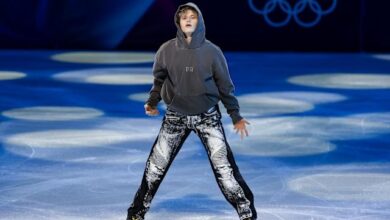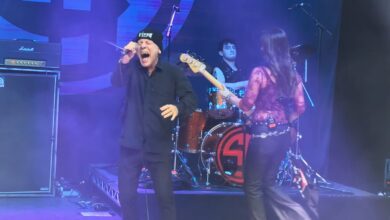Heart Ignite the Rock Hall Stage with a Powerful “Crazy on You” Performance
Heart’s 2013 Rock and Roll Hall of Fame moment found the band celebrating induction night by opening their three-song set with “Crazy on You,” reminding a black-tie crowd why the Wilson sisters became fixtures of FM radio and arena stages. The ceremony took place on April 18, 2013, at the Nokia Theatre L.A. Live in Los Angeles, and the group had been inducted moments earlier by Chris Cornell, a Seattle protégé who understood their impact as hometown trailblazers.
“Crazy on You” wasn’t a cover choice dusted off for nostalgia—it was their own breakthrough single from 1976’s Dreamboat Annie, the track that fused Nancy Wilson’s fleet acoustic work with Ann Wilson’s operatic power and set Heart’s aesthetic compass. The studio cut famously begins with an acoustic prelude often referred to as “Silver Wheels,” foregrounding the fingerstyle engine that drives the song’s dynamics before the band crashes in.
The Hall set that night followed a narrative arc: the original lineup reuniting on “Crazy on You,” the sisters turning inward for a delicate “Dreamboat Annie,” and then a finale of “Barracuda” supercharged by friends from the Seattle rock family. That programming framed Heart’s range—from whisper to roar—and situated “Crazy on You” as both historical calling card and living, breathing showpiece.
Reunion history gave the opener extra voltage. For the first time in more than three decades, the classic unit—Ann and Nancy Wilson with Howard Leese, Steve Fossen, Michael Derosier, and Roger Fisher—stood on the same stage, returning to the tune that first announced them to the world. The symbolism was plain: the song that launched them would also mark their formal entry into the pantheon.
Much of the awe in the room came before a lyric was sung. Nancy’s acoustic introduction—alternately described as “Silver Wheels” and simply “the intro”—has long been cited as one of rock’s most striking openings, a percussive, harmonically rich burst that sounds both finely wrought and dangerously alive. She has explained the technique in detail over the years, from the thumbpick-and-fingers attack to the physical fight with a high-action jumbo acoustic.
Hearing that prelude in a Hall of Fame theater sharpened the sense that no two introductions are quite the same. Wilson’s right-hand patterning and shifting emphasis made the passage feel improvised within a form, and that looseness set up the band’s entrance perfectly. Fans often describe a chill at the downbeat where the full arrangement lands—an effect amplified by the production sheen of a broadcast-scale event.
Ann Wilson’s entrance carried a different kind of electricity. In her early sixties at the time, she demonstrated the command and altitude that defined her 1970s recordings, producing sustained high notes with a clarity that has become rarer as rock singers age. The Hall performance affirmed why she is so frequently singled out in rankings of rock’s most formidable vocalists and why that reputation persists.
The version many fans revisit online captures the balance of danger and poise that Heart cultivated on stage. Official outlets have shared clips over the years, and audience videos continue to circulate, but the core impression is consistent: a band honoring its past without embalming it, a singer and guitarist treating an old hit as a living composition rather than a museum piece.
Setlist records from the night help place the performance in context. “Crazy on You” opened, “Dreamboat Annie” followed as a reflective interlude, and “Barracuda” closed with guest firepower—Chris Cornell on guest vocals and guitar tandem work from Pearl Jam’s Mike McCready and Alice in Chains’ Jerry Cantrell. That sequencing turned the opener into a mission statement and the closer into a communal victory lap.
The induction itself had been a long time coming. Ann and Nancy Wilson were the first women to front a hard rock band at Heart’s scale, and the Rock Hall’s own profile frames their legacy in those terms: pioneers whose presence inspired countless players to pick up electrics and play loud. Cornell’s induction speech underscored that lineage, connecting 1970s Heart to the later Seattle wave.
For listeners who prize the song’s acoustic architecture, the 2013 take also functioned as a mini-masterclass. Interviews across the years reveal how the intro grew from a desire to capture percussive urgency on an acoustic instrument, with Roger Fisher’s signature riff and Nancy Wilson’s arrangement choices burning into muscle memory. The Hall performance distilled those ideas into a few unforgettable bars.
Audio from the ceremony later surfaced in official compilations, preserving the arrangement as it was played in the room and allowing comparisons with earlier and later tours. Those live releases reinforce how the Wilsons keep the architecture intact while letting feel and phrasing evolve, which is part of why the song endures in performance decades after its chart debut.
It is easy to romanticize induction nights, but the facts here hold up to the mythology. The venue, the reunion, the song order, and the guest list are all well documented, and each element adds weight to how “Crazy on You” landed. The track’s contrast—a filigreed acoustic overture detonating into hard-rock release—works especially well in a formal hall with sharp acoustics.
For many observers, the evening also doubled as a referendum on longevity. How many rock singers in their sixties can still summon that kind of altitude without transposing parts downward or parceling out hard passages to the audience? The recording answers in the affirmative, reminding listeners that Ann Wilson’s ceiling remains unusually high for a voice forged in the 1970s.
Finally, the 2013 “Crazy on You” crystallized why Heart’s legacy rests on two intertwined strengths: a guitarist whose intro can stop a room cold, and a singer whose full-throated entrance can lift it to a different floor. The piece’s reputation as one of rock’s great opening statements, paired with a lead vocal that still cuts like a beacon, made the induction performance feel less like a ceremonial obligation and more like a definitive argument for their place in the canon.





